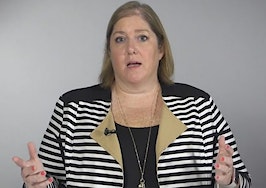- Former Wall Street analyst Sallie Krawcheck says higher-ups should stop telling women to "act like men."
- Instead, Krawcheck suggests drawing on the unique viewpoint of women that include things such as greater risk awareness and holistic decision-making.
A couple is sitting down at a candlelit table, preparing themselves for a delicious dinner. When the waiter comes over, the man immediately orders a big, juicy steak.
The woman mulls over the menu a little longer — she thinks about ordering the steak, but decides not to (she ate a steak last week). She goes through each of the other options, much to her husband’s chagrin, and decides to order salmon, a healthy balance to the indulgent meal she had the last time they visited the restaurant.
The next week, the husband dies from a heart attack due to uncontrolled high cholesterol. It looks like he should have ordered the salmon, huh?
For Sallie Krawcheck — who spoke at Inman Connect New York this year — this story is about more than the woes of eating one too many steaks; it shows an integral difference between the way men and women think. Although the man made a more efficient decision in the moment, the woman made a more holistic decision that was better in the long run.
When applied to the business world, she says this difference could tip the scales between life and death for a company.
That’s the topic of Own It! The Power of Women At Work, Krawcheck’s book outlining the value of having more women in leadership positions.
Trust yourself
Krawcheck, a former Wall Street analyst, says she learned to wield her power as a 29-year-old mother who was struggling to get back into the workforce after a brief hiatus.
She was rejected by some of the biggest companies, such as Merrill Lynch and Morgan Stanley, before she landed at Stanford Bernstein — a smaller and less well-known management company.
Her first assignment was a research report about American General — a company with its hand in a number of areas, including mortgage lending.
As she dug through the numbers, Krawcheck came to a startling realization: “I believed the rapid growth was masking something: deterioration in quality.”
She sent the report a representative at American General, who gave her a piece of “advice”: Don’t publish this report.
Krawcheck published it anyway, and she cited the fact that the numbers were more than numbers to her. They represented families and individuals who were working to make their lives better and who needed to know their investments were in danger.
A month later, American General was floundering due to what Krawcheck had predicted.
Quit telling women to think like men
Krawcheck said the relationship focus she brought to the report allowed her to see beyond the data — something that some male bosses write off as women being “too emotional.”
“Quit telling women to think like men,” she said. “There’s so much power in diversity. It is by adding difference that we draw better results.”
So what other things do women bring to the workplace?
- Women bring a longer-term orientation.
- Women bring risk awareness. Women ask what the downside is.
- Women bring holistic decision-making. Men may make an efficient decision, but women tend to make slower (but potentially better) decisions. Remember the steak?
- Women bring a love of life-long learning and a sense of purpose.
“The research shows that when you have women in positions of power, companies have higher returns on equity, lower risk, greater client focus, greater employee engagement and greater innovation,” she said.
Women are the present and the future
Beyond the workplace, Krawcheck says women have enormous economic power that drives the current economy and will bolster it in years to come.
She noted that women have $5 trillion in investible assets and represent 80 percent in overall spending, comprise half of the current workforce and start businesses at twice the rate of men.
“For women to connect with more money; it’s good for women, it’s good for our children, it’s good for closing the retirement savings gap, which is a crisis. It’s good for businesses, economy, society,” she said.
“And just think, gentlemen — for those who aren’t totally convinced — do you have any women customers?”












